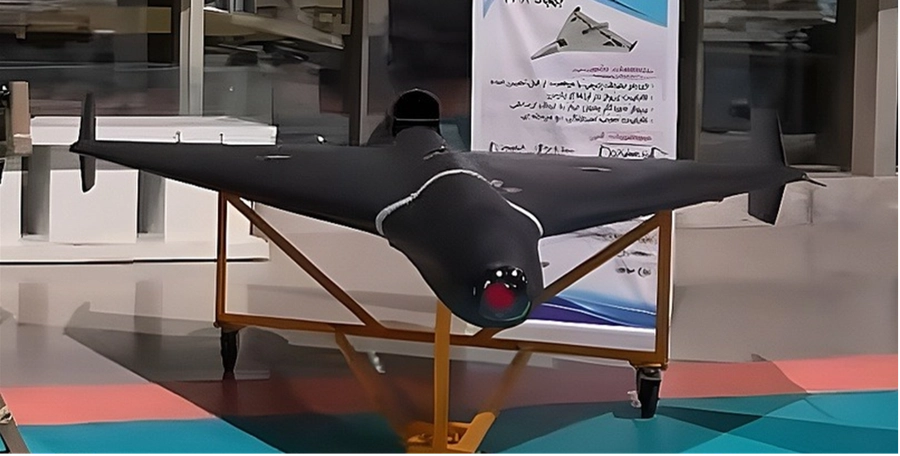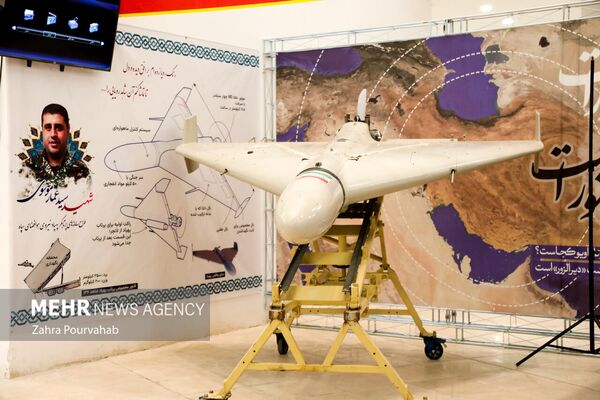Iran Develops New, More Lethal Suicide Drone to be used by Russian Forces in Ukraine
The newly introduced drone, named "Shahed-107," is reported to have a range of 1,500 kilometers and is designed to neutralize “expensive” weapon systems supplied by Western countries to Ukraine.
(DEFENCE SECURITY ASIA) — The Iranian military is reported to have developed a new kamikaze and surveillance drone for use by the Russian military in its ongoing campaign against Ukraine, now entering its second year.
The newly introduced drone, named “Shahed-107,” is reported to have a range of 1,500 kilometers and is designed to neutralize “expensive” weapon systems supplied by Western countries to Ukraine.
Security authorities in Ukraine have expressed concern about the appearance of this new drone type in their country.
According to security sources, Iran’s latest drone development is aimed at supporting Russia’s interests in Ukraine.
Each newly developed drone by Iran for the use of the Russian military is estimated to be worth $2 million (RM9 million), and the source also states that the drone in question belongs to the Shahed drone family, previously operated by Moscow.
With a total length ranging between 8 to 10 feet, the Shahed-107 drone has undergone testing at an Iranian airbase in the central part of the country, observed by representatives of the Russian military.

Russia employs these kamikaze drones as a tactic to compel Ukraine to use its costly air defense systems supplied by Western nations.
Ukraine is forced to use Western-supplied air defense systems, where each the interceptor missile is estimated to cost more than $500,000 to shoot down each kamikaze drone from Russia, estimated to cost only $20,000 to develop.
Recently, a senior Russian military official revealed that their forces will soon utilize the latest variant of the kamikaze drone, the Shahed-136, which is more dangerous and capable in their conflict with Ukraine.
The Shahed-136 drone is manufactured in Iran but supplied to Russia, which enhances its capabilities with the latest technology and new engines.
Compared to the original variant received from Iran, the modified kamikaze drone variants equipped by Russia include powerful jet engines for faster flight to the target, making it harder to be shot down by Ukraine’s air defense systems.
Earlier, Ukrainian military officials claimed that the Iranian-produced kamikaze drones used by Russia were easily shot down due to their low-speed piston engines and loud noise, earning them the nickname “moped” (scooter).

However, Major General Vladimir Popov, a senior Russian military official, stated in a recent interview with Sputnik TV that their forces will deploy the latest variant of the “Shahed” kamikaze drone known as Geran-2, which is more “dangerous” and capable.
“The latest variant of Geran-2 kamikaze drone will be equipped with a jet engine, providing it with a speed of 800 km/h, a much-improved target tracking system, and a larger explosive payload,” he said.
The upcoming Shahed-136 variant to be used by the Russian military is significantly faster than the original Iranian-produced kamikaze drone, which can only reach speeds between 180 to 200 km/h.
Moreover, the senior Russian military official mentioned that the latest Shahed-136 kamikaze drone variant will also incorporate satellite tracking systems using GLONASS and infrared technology, enabling it to identify military targets more effectively.
Additionally, Moscow is reportedly planning to outfit the Iranian-produced kamikaze drone with its own radar system to enable it to target high-value military assets such as radar facilities and enemy air defense systems.
The latest Shahed-136 variant, equipped with a jet engine, is also reported to be painted black to make visual detection by the enemy more challenging, thereby reducing the likelihood of being shot down. – DSA


Comments are closed.